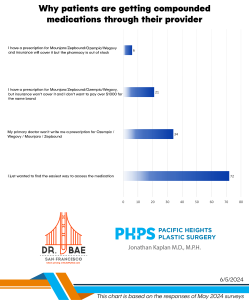
When I first moved from Louisiana to San Francisco just under three years ago, I took over an existing plastic surgery practice. The previous doctor had about 200 email addresses in his database. I knew if I wanted to build a bigger practice, I would need a bigger database of email addresses. I really had no medical marketing budget so I needed to be creative. How would I get more leads and email addresses?
I quickly realized that encouraging consumers to enter their contact info when visiting my website would require a large “carrot.” Leaving your identity behind on some strange doctor’s website can be scary. Come to find out, the incentive they needed was the carrot of pricing information.
1. Lead Generation using Pricing Info as the “Carrot”
Everyone wants to know the cost of whatever they’re buying. It doesn’t make them a price shopper necessarily but price is clearly the ultimate pain point in the decision making process, especially plastic surgery. I’m not suggesting that consumers aren’t worried about things other than price – of course, they’re worried about the doctor’s credentials, the vibe, if they can get time off work, what procedure they’re a candidate for (by the way, with so many non-surgical options, everyone is a candidate for something) – but the only absolute pain point is whether it’s affordable or not.
So I installed the BuildMyBod Price Estimator into my website. With this type of price estimator, the consumer scrolls down a list of the various procedures and services I offer in my practice, adds procedures of interest to a “wishlist” and then submits that wishlist for pricing. The automated nature of the price estimator allows pricing information to be downloaded and immediately sent to the consumer in an email with a breakdown of costs for the procedures they selected. At the same time, I receive an email with their contact info. Every patient is contacted by my front office staff to see if they’d like to come in for a consultation.
In my first year, without a discernible marketing budget, I received 412 wishlists from 208 patients. 17.8% of those consumers came in for a consultation and 62% of them booked a procedure. When compared to patients that came in for a consultation that were not price-aware (i.e. they had not submitted a wishlist for pricing info), the price-aware patients were 41% more likely to book a procedure than non-price aware patients. With more serious patients and the avoidance of sticker shock, the consults were more productive and patients weren’t wasting their time on a 45-minute consultation that went nowhere because they found out the procedure was out of their budget.
And by the way, once I started paying for marketing in the way of TV advertising during my second year in practice, I received 4,156 wishlists from 2,164 consumers! I’m not sure of the correlation but I found that of the price-aware consumers that came in for a consultation, 75% of them booked as opposed to the 62% of consumers in the pre-marketing days.
2. Other Carrots for Lead Generation – Online Scheduling
While providing pricing information is by far the most effective carrot for lead generation, there are other ways to capture a patient. Patients don’t always think of calling the office for an appointment during work hours. So make it easier for them. By using true online scheduling software like STX (not ZocDoc – this software doesn’t provide true online scheduling), the patient can schedule anytime they think of it. As you will see in my “results” section below, online scheduling can be a powerful additional tool to lead generation.
3. Online Purchasing
Selling products on your website may be obvious, but why not sell non-surgical services on your site as well?! Patients that aren’t new to Botox or fillers know what they want just like they know what skin care products they want. Using the BuildMyBod BuyNow widget on my site, consumers can purchase any non-surgical services I choose to sell online. Don’t think consumers will purchase?
In the two years that I’ve provided this service on my website, I’ve had 292 online purchases that totaled over $70,000! And when you start selling services on your site, taking part in Cyber Monday after Thanksgiving isn’t out of the question! As you can see in this article in the Cosmetic Surgery Times, during the 24-hour Cyber Monday shopping period, we sold $13,600 in non-surgical services through our online portal. So aside from capturing a lead, we captured a tech-saavy patient!
4. Clever Use of Social Media
 You will start to hear the term “influencer” much more in the world of marketing. The idea is to get away from spending large sums of money on advertising and instead, get someone that has a lot of followers on social media, an “influencer,” to promote your product or practice. While you may provide them with a discount on your services, that discount pales in comparison to how much you would have spent on advertising.
You will start to hear the term “influencer” much more in the world of marketing. The idea is to get away from spending large sums of money on advertising and instead, get someone that has a lot of followers on social media, an “influencer,” to promote your product or practice. While you may provide them with a discount on your services, that discount pales in comparison to how much you would have spent on advertising.
In this Instagram example, when patients come in for Botox or fillers, we have them stand in front of our “I got stuck at PHPS” neon sign – complete with a neon face with “11’s” in between the brows that is a clear reference to the brow wrinkles typically treated with Botox. Seems silly? Maybe, but when each successive patient posts the photo on their respective Facebook or Instagram accounts with our location and the hastag #igotstuckatphps, we now have multiple influencers informing their followers that 1) we exist and 2) we provide non-surgical services. While there may be some folks uninterested in promoting their use of Botox and fillers, a growing number of millennials really don’t care.
5. Email marketing
Aside from collecting email addresses in exchange for providing pricing knowledge, to what end do we need to build a database of email addresses? With a large database, you can start to conduct effective email marketing campaigns. This provides additional touch points with the consumer that has provided you with their email address and opted into communications with your practice.
Whichever you choose, there are several options for email marketing software – Constant Contact, MailChimp, Campaign Monitor. They all have the ability to collect all incoming leads and seamlessly and automatically sync them to your email database. Then, once per month, create a monthly newsletter with their very user-friendly software, and send it out to your rapidly and passively growing email database. Check out my most recent email newsletter here.
Measuring Your Medical Marketing Results: How it all comes together!
Once you’ve built your database through any of the methods described above, you can test your medical marketing by evaluating the response you get from your monthly email newsletter. After sending out my April email newsletter to 4,588 clients at 5:05pm on Thursday evening, March 31st, I had a pretty impressive response that any marketing team would kill for! Here are the high points:
- -Four online bookings
- -29 wishlists from 17 unique individuals, of those…
- -Three of the people that submitted wishlists were brand new to the practice and somehow got a copy of the email newsletter
- -14 of the people that submitted wishlists were former patients that are now re-engaged!
- -Of the 4,588 emails sent, ZERO were marked as spam suggesting the recipients realized they had signed up for this email at some point
- -44 emails bounced (0.96%) suggesting that far and away, most consumers submitting wishlists are submitting real email addresses
- -19 people unsubscribed (0.42%)
- -Overall, there was a 20.73% open rate and a 15.82% click rate within the first day (in case you don’t know how this compares, it’s good…REALLY, REALLY GOOD!)
Now that you have the keys to the kingdom, or the ingredients to the secret sauce, these five steps are actionable and relatively inexpensive to implement. So stop reading and get to work!
Click here for the original blog post written by Dr. Jonathan Kaplan for BuildMyBod.




